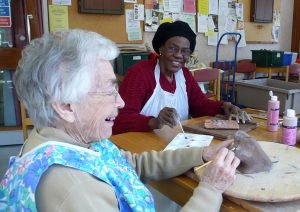
This scenario seems to be approaching reality in the U.K., where a current research found that 66 percent of physicians believe the arts have a positive part to play in preventing illness.
The findings are encouraging while it is going to take more to influence change.
"In lots of conversations I have had within the health system, people think of the arts as something that is wonderful to have, yet another; it is a fluff," "And what comes after that research is they think that it's got real potential."
Is there a future in which the arts become incorporated into healthcare offerings? While it's a ways off, health care players from the U.K. are taking steps in this direction. This involves GPs discovering that there is not an proper medical solution for their individual, such as surgery, medication, or treatment, and referring them to someone who's knowledgeable about the local community and its offerings -- to urge recreational and social activities that match their interests, such as the arts.
"The evidence shows that actions like social clubs, art, ballroom dancing and gardening can be more powerful than medicines for some folks, and I wish to see an increase in that type of societal prescribing," "People go to their doctor because they do not know where else to go; they trust their physician and they will only do what the doctor says," "I feel that it is a much more sustainable, deep treatment if you prescribe somebody a group or a clinic or a skill they can take together."
She noticed that her center's arts programming, like a favorite singing group on Saturday mornings, has been useful for a broad assortment of patients--those with depression, chronic diseases, or mood and movement disorders, in addition to those that are grieving. "A lot of these patients are older and that really helps to combat isolation and loneliness," she added. "We have always understood one of the principal things is a sense of community and also imagination, creating something, engaging in something that's enjoyable and has purpose."
When asked about the impetus behind the larger interest for arts in health now, Marshall-Andrews suggested that there is a general understanding among GPs that patients' needs aren't being fulfilled and NHS resources are lacking. "We have had to try and look outside [of NHS] and that everybody's under stress," she said, noting that individuals are living much longer, in more isolated surroundings, and less community support. "A great deal of social change was medicalized," she explained,"and we are beginning to understand that and try and do something about it."
Aesop Charity is grappling with this tension between individual needs and NHS resources. The charity, which sees itself as a bridge-builder between the health system and arts organizations, is trying to create programs which implemented and may be funded from the NHS. "The simple thing we are trying to do is to produce arts programs that are cost-effective and effective, so the health system will actually cover them because of they're saving the health system money," Joss said. Its first program, known as Dance is geared toward preventing the elderly.
It costs the NHS #2.3 billion annually to treat elderly patients that have experienced painful mental health conditions, Joss learned. He discovered that the response to this problem of the health system was a set of exercises that were repetitive. "We asked:' Can we smuggle those evidence-based exercises to creative, social dance action? That's just what Aesop has done to Health, which it has started to implement in cooperation with dance companies such as National Dance Company Wales and the Birmingham Royal Ballet with Dance.
Joss added that he sees great potential in terms of engaging artists that are eager to contribute to direct arts and wellness programs. However, it's not simple, '' he explained, given that a lot of this art world's creation is project-based. "The health system needs national, sustainable solutions so there may be a fantastic art project, but if a GP hears about it, their first question will be:'Is it available in my area?' And I am afraid to say there's not a single arts program yet that's accessible to all GPs across England," Joss explained. The intention is to fill this emptiness to Health with programs like Dance, but Joss explained that Aesop is planning to serve to collaborate to cultivate their arts and wellness initiatives.
"Surely, in Britain, we are proud of our art scene as well as our creative industry--we are considered a world player," Joss reflected,"but when you consider the arts' contribution to health, we have a long way to go."